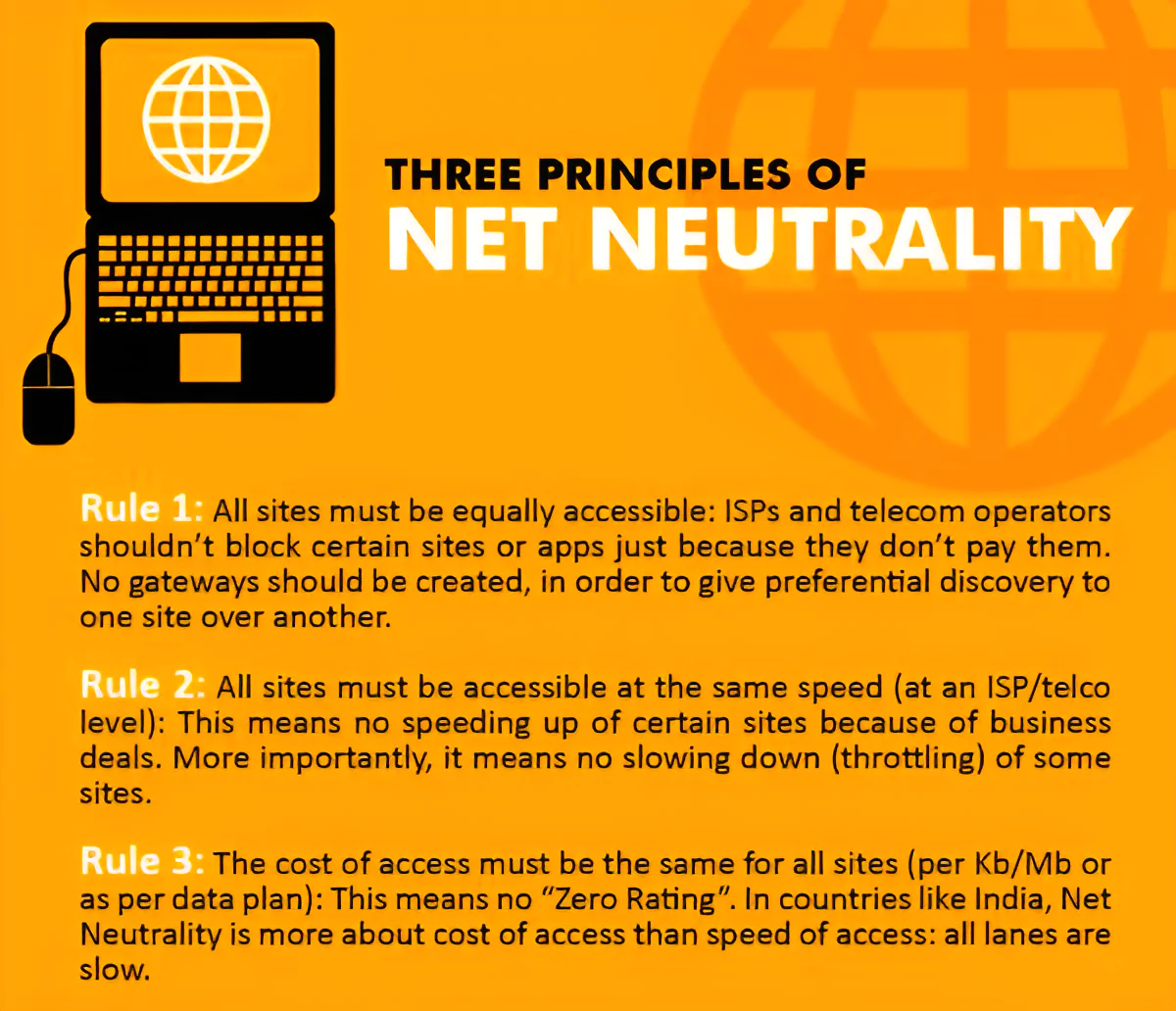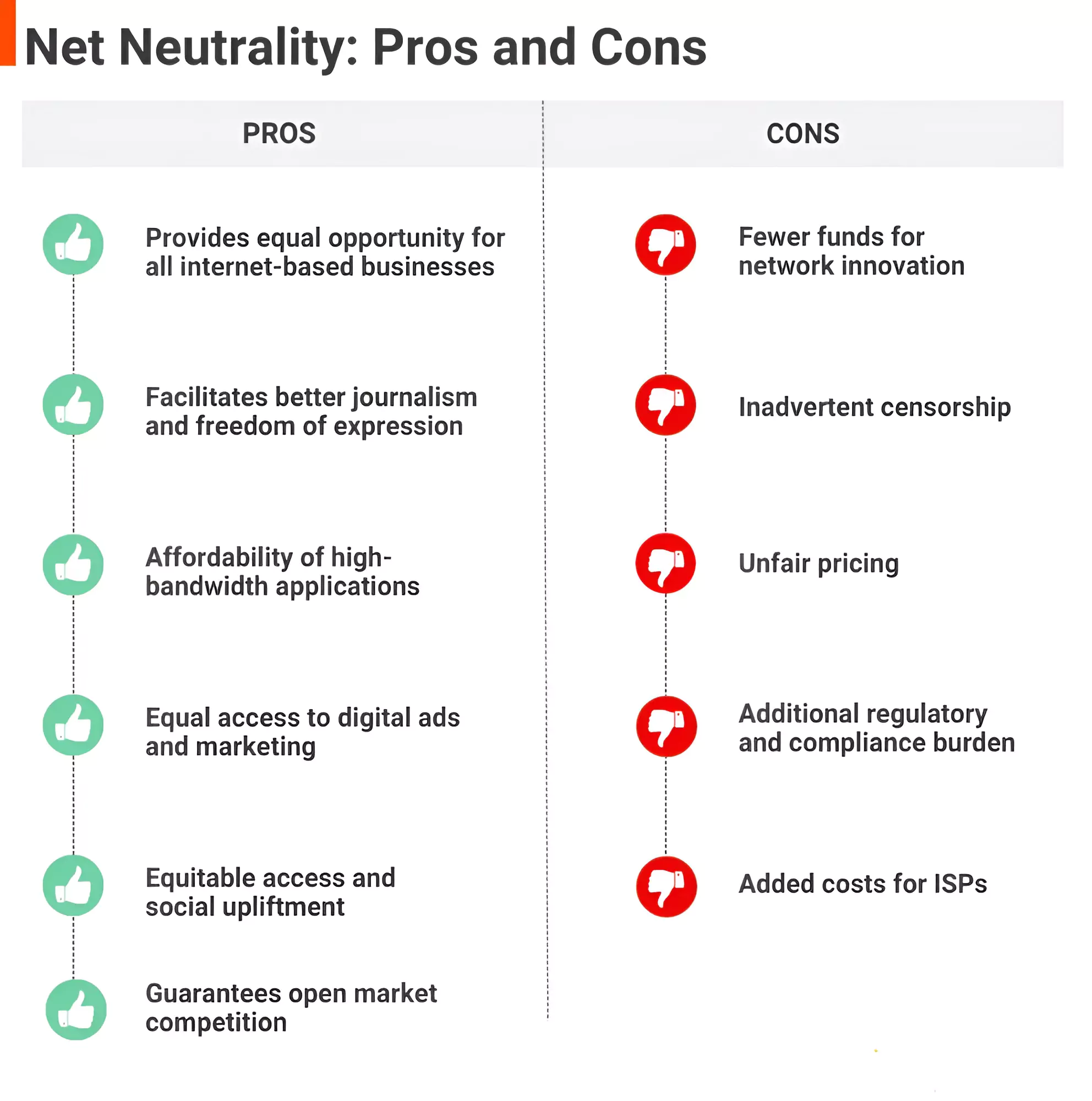Context
Recently, The Federal Communications Commission of USA voted to reinstate Net Neutrality regulations.
FCC Reinstates Net Neutrality Rules in the US: Implications and Controversies
- Reinstatement: The five-member FCC, in a 3-to-2 vote along the party lines, revived the rules declaring broadband a public utility-like service which will now be regulated like phones and water.
- The FCC framed the present rules giving effect to the Net Neutrality and Broadband Justice Act 2022, which classified broadband internet access as a telecommunications service under Title II of the Communications Act.
- Regulatory Powers: The rules give the F.C.C. the ability to demand from broadband providers that they report and respond to outages, as well as expand the agency’s oversight of the providers’ security issues.
- However, The order explicitly avoids rate regulation.
- The FCC said it was also using its new authority to order the U.S. units of China Telecom, China Unicom and China Mobile to discontinue broadband internet access services in the United States.
Net Neutrality
Net Neutrality Regulations were first introduced under the Obama administration in 2015, but were repealed under President Donald J. Trump in 2017.
- State Law: In the vacuum of federal regulations, several states including California and Washington created their own net neutrality laws.
- It refers to the principle that internet service providers should enable access to all content and applications regardless of the source, and without favoring or blocking particular products or websites.
- The rules typically prohibit internet-service providers from assigning priority to certain web traffic or creating so-called fast lanes for certain websites. They also restrict providers from throttling, or slowing down, traffic to websites that don’t pay up.
 Origin: It term was coined by Columbia University law professor Tim Wu in his 2003 paper titled “Network Neutrality, Broadband Discrimination”.
Origin: It term was coined by Columbia University law professor Tim Wu in his 2003 paper titled “Network Neutrality, Broadband Discrimination”. - As a Concept: The discussions on Net Neutrality considers the following issues in Internet access and control regarding online freedom of expression, competition of service, innovation, pricing, and internet traffic management.
Enroll now for UPSC Online Course
Arguments for Net Neutrality
- Equal access to Internet: It does not allow ISPs to determine the speed at which consumers can access specific websites or services and smaller companies will be more likely to enter the market and create new services.
- Open Internet: Net neutrality ensures an open internet and prevents broadband providers from practicing data discrimination as a competitive tactic.
- Ensuring Accountability: The Rules will empower the FCC to hold companies like AT&T, Comcast, Spectrum and Verizon accountable for preferential and discriminatory business practices.
- Example: Verizon’s throttling of services affected the Santa Clara County Fire Department’s ability to provide emergency services during the California wildfires
- Telecom Toll: Regulation is critical to ensure equal and non discriminatory preferential access to digital content and websites to internet users.
- Example: Comcast introduced new speed limits where videos will be throttled to 480p on all its mobile plans unless customers pay extra and could charge content owners such as Netflix to pay extra, to have its videos delivered smoothly to viewers.

Arguments Against Net Neutrality
- Unethical traffic prioritization: It is a practice of prioritizing certain types of traffic over others using a network management tool which is generally acceptable in corporate settings. But when it is introduced in the open, public internet it ends up regulating user behavior which is not ethical.
- Guardrails on investment and innovation: Forcing ISPs to treat all traffic equally the government will ultimately discourage the investment in new infrastructure, and will also create a disincentive for ISPs to innovate.
- Derail telecommunications industry growth: ISPs argue that tiered prices allow them to remain competitive and generate funds needed for further innovation and expansion of broadband networks, as well as to recoup the costs already invested in broadband
- Unnecessary government oversight: There have been few examples of blocking or slowing of sites in the intervening period because of the existence of sufficient provision in law that will bar discriminatory practice.
Recommendations: As per a Department of Telecommunication Committee Report 2015 on Net Neutrality
- Innovation and infrastructure: To identify and eliminate actions that inhibit the innovation abilities inherent in an open Internet or severely inhibit investment in infrastructure.
- Adhering to Principles: To achieve the developmental aims of the country by facilitating “Affordable Broadband”, “Quality Broadband” and “Universal Broadband” for its citizens
- Assured User rights: It needs to be ensured so that TSPs/ISPs do not restrict the ability of the user to send, receive, display, use, post any legal content, application or service on the Internet, or restrict any kind of lawful Internet activity or use.
- Encourage OTT expansion: OTT application services should be actively encouraged and any impediments in expansion and growth of OTT application services should be removed.
- There should be a separation of “application layer” from “network layer” as application services are delivered over a licensed network.
- Traffic management practices: Legitimate Practices may be allowed but should be tested against the core principles of Net Neutrality.
- TSPs/ISPs should make adequate disclosures to the users about their traffic management policies, tools and intervention practices to maintain transparency and allow users to make informed choices
Net Neutrality in India
India Prohibits differential pricing and explicitly upholds net neutrality with the strongest net neutrality regulations in the world, however there is no legislation or net neutrality yet.
- The Telecom Regulatory Authority of India (TRAI) prohibited differential pricing of data services in February 2016.
- Example: Airtel in 2014 was to roll out a plan that will differentially price calls that are made on its network – both voice and video calls, using skype or viber.
- TRAI has issued a consultation paper on regulatory framework for Over-the-top services (OTT) like Viber, WhatsApp, Snapchat, Hike etc. and asked for public feedback. It is focused on OTTS and their licensing.
|
Also Read: Regulation Code For OTT Platforms In India
![]() 26 Apr 2024
26 Apr 2024
 Origin: It term was coined by Columbia University law professor Tim Wu in his 2003 paper titled “Network Neutrality, Broadband Discrimination”.
Origin: It term was coined by Columbia University law professor Tim Wu in his 2003 paper titled “Network Neutrality, Broadband Discrimination”. 